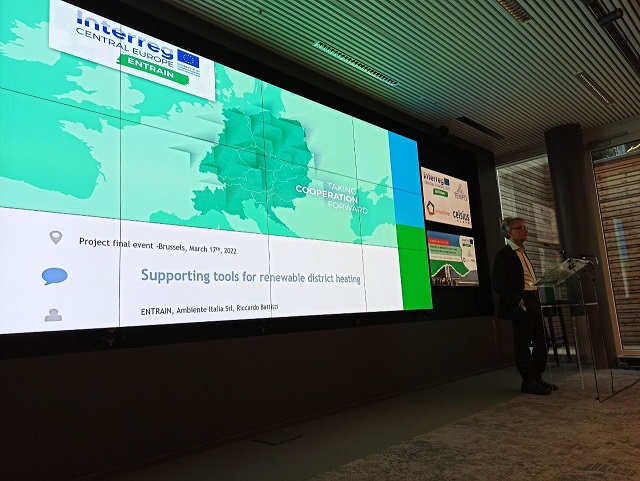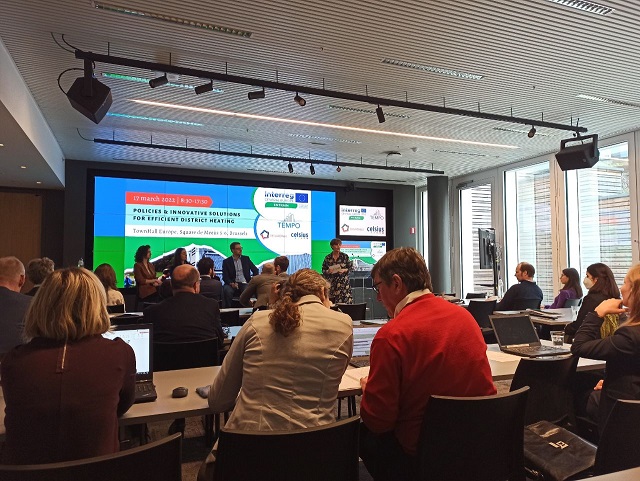Policies and innovative solutions for efficient DH
JOINT FINAL CONFERENCE ON MARCH 17 IN BRUSSELS!
The modernisation and decarbonisation of district heating (DH) require multifaceted action. The establishment of an enabling policy framework is needed to support the roll-out of networks across Europe; while innovative technical solutions are required to upgrade networks and enable the efficient integration of local and renewable energy sources (RES).
On March 17 in Brussels projects ENTRAIN, REWARDHeat, TEMPO and the Celsius Initiative teamed up for a full-day workshop that focused on both approaches: best-practice policies and actions for fostering the use of local energy sources, as well as technological innovations to optimise the operating temperature of the district heating networks. The event was attended by more than 50 participants at TownHall Europe, Square de Meeûs 5-6.
Dowload the presentations (PDF document)


- PRESS RELEASE
- Policies and Innovative Solutions for Efficient District Heating
-
- The modernisation and decarbonisation of district heating (DH) require multifaceted action. The establishment of an enabling policy framework is needed to support the roll-out of networks across Europe; while innovative technical solutions are required to upgrade networks and enable the efficient integration of local and renewable energy sources (RES).
- On March 17 in Brussels projects ENTRAIN, TEMPO, REWARDHeat and the Celsius Initiative teamed up for a full-day workshop that focused on both approaches: best-practice policies and actions for fostering the use of local energy sources, as well as technological innovations to optimise the operating temperature of the district heating networks. The event was attended by more than 50 participants at TownHall Europe, Square de Meeûs 5-6. The presentations shown during the conference are available online in the linked pages below.
-
- The first session, focusing on the results of the Interreg Central Europe project ENTRAIN, first of all presented a variety of supporting tools for district heating from renewables, developed during the project and made available on its website (www.interreg-central.eu/entrain): initial surveys, regional RES DH action plans, evaluations of the potential for renewable district heating, guidelines for planning renewable DH systems, a wide and comprehensive training toolbox tailored to different target groups, the documents of a quality management system and a collection of videos for virtual site visits and study tours. The Austrian project partners, acting as know-how providers, presented the status of renewable district heating in the country, also highlighting several success stories and best practices.
- Afterwards, the 5 ENTRAIN target areas from Italy, Germany, Slovenia, Croatia and Poland presented some of the main results of the implementation of concrete actions at local level: the application of the Austrian ‘QM Heizwerke’ quality management system in Italy, the development of RES DH projects with a strong engagement of the local communities in Germany, the setting up of a policy enabling framework for RES DHC development in Poland, the use of geothermal energy in the DH network for the Croatian city of Karlovac and, finally, the efficient renovation and decarbonisation of existing DH infrastructures for the Slovenian city of Ptuj.
- Access the presentations here: https://www.interreg-central.eu/Content.Node/ENTRAIN/Final-conference-teaser.html
- The second session was organized by the REWARDHeat project and the Celsius Initiative as a Policy Workshop. It started with a short introduction to the recently published paper of REWARDHeat and after that, two roundtable discussions took place with the audience actively participating with questions and remarks. The main messages to take away include:
- - DHC is expected to grow, particularly in urban areas where it is seen as an enabler for the integration of renewables and waste heat;
- - Energy efficiency will also be important for the transition, particularly building renovations need to be sped up, also to enable low-temperature DH;
- - Cooperation between different actors is essential, and in particular with cities;
- - Energy planning is perceived as one of the most important factors to decarbonise heating and cooling and to allow DHC to grow - local planning but also national heating and cooling strategies with concrete measures to decarbonise;
- - Waste heat should be prioritised and used whenever available - industrial sources will remain important but tertiary sources although widely available are still underutilised;
- - DHC has a role to play in an electrified future, in the perspective of sector integration, with heat pump and e-boilers, and for grid balancing with thermal storage.
- Read more and access the paper here: https://www.rewardheat.eu/en/home
- The third session marked the completion of the H2020 TEMPO project work as its final event. First, the comprehensive solution package for lowering the temperature was presented, which consists of technological innovations on the network and building side, consumer empowerment enabled by digital solutions, and an innovative business model for EU replication. The demonstration sites at Windsbach (Germany) and Brescia (Italy) along with all their experience, success and lessons were the highlights of the session. The technical innovations included: the Smart DH network controller to balance supply and demand and minimise return temperature, the compact individual buffer unit ‘CaldoTherm’ to allow peak shaving, and a new triple-pipe system with smaller dimensions that alleviates the investment costs.
- During the panel discussions, the benefits oflow-temperature district heating (LTDH) were underlined, as they also constitute the objectives of TEMPO innovations: fewer heat losses, increased share of low-temperature RES, increased efficiency of heat production technologies. As it was plainly put, the lower the network temperature drops, the higher the integration of waste heat sources. Furthermore, it was emphasized that engagement and commitment from the end-users require trust; meeting in person with consumers was crucial for a successful outcome. With the help of the new digitalisation tools, a significant amount of useful data is now available, which in turn can feed with facts the dialogue between stakeholders and empower end-users.
Read more and access the presentations here: https://www.tempo-dhc.eu/tempo-final-event/
